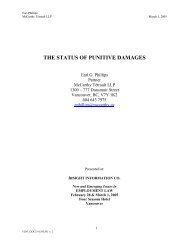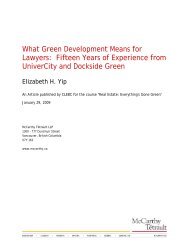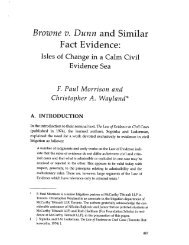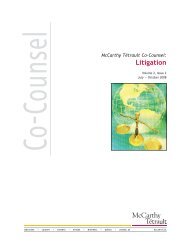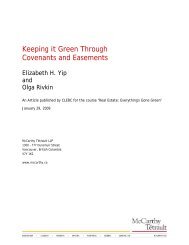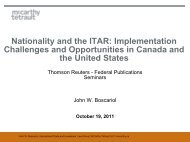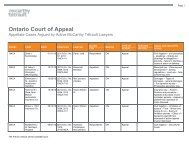The Doctrine of Public Policy in Canadian Contract Law
The Doctrine of Public Policy in Canadian Contract Law
The Doctrine of Public Policy in Canadian Contract Law
Create successful ePaper yourself
Turn your PDF publications into a flip-book with our unique Google optimized e-Paper software.
<strong>The</strong> <strong>Doctr<strong>in</strong>e</strong> <strong>of</strong> <strong>Public</strong> <strong>Policy</strong> <strong>in</strong> <strong>Canadian</strong> <strong>Contract</strong> <strong>Law</strong> 17<br />
until the eighteenth century."" As English society progressed, and the number<br />
<strong>of</strong> precedents and statutes began to swell, there was <strong>in</strong>creas<strong>in</strong>gly less need for<br />
a general, undef<strong>in</strong>ed idea <strong>of</strong> the "common good" to fill <strong>in</strong> the more glar<strong>in</strong>g<br />
"gaps" <strong>of</strong> the common law.34 It was <strong>in</strong> part because <strong>of</strong> this reality that <strong>in</strong> the<br />
eighteenth century the concept <strong>of</strong> public policy was first recognized as a dist<strong>in</strong>ct<br />
doctr<strong>in</strong>e <strong>in</strong> the case <strong>of</strong> Mitchel v. Reynolds.35 To be sure, public policy <strong>in</strong> the<br />
eighteenth century had yet to be ref<strong>in</strong>ed, and was still "a pr<strong>in</strong>ciple stated <strong>in</strong>.. .<br />
sweep<strong>in</strong>g terms."36 Yet its acceptance <strong>in</strong> this period as a conceptually discrete<br />
source <strong>of</strong> legal precedent, whatever its ultimate ambit, entailed that "[i]nstead<br />
<strong>of</strong> sprawl<strong>in</strong>g <strong>in</strong> vaporous fashion across the legal atmosphere like a genie <strong>of</strong> the<br />
Arabian Nights, it [was] shr<strong>in</strong>k<strong>in</strong>g to certa<strong>in</strong> departments <strong>of</strong> the law..."37<br />
In the n<strong>in</strong>eteenth century, the courts sought to conf<strong>in</strong>e the reach <strong>of</strong> the<br />
doctr<strong>in</strong>e to the limited number <strong>of</strong> categories which are discussed below. <strong>The</strong><br />
general judicial attitude <strong>of</strong> the period is summarized by the famous statement<br />
<strong>of</strong> Burrough J. <strong>in</strong> Richardson v. Mellish, that public policy "is a very unruly<br />
horse, and when once you get astride it you never know where it will carry<br />
you."" To similar effect were the follow<strong>in</strong>g sentiments expressed by Jesse'<br />
M.R. <strong>in</strong> Pr<strong>in</strong>t<strong>in</strong>g & Numerical Registry Co. v. Sampson:<br />
pit must not be forgotten that you are not to extend arbitrarily those rules which<br />
say that a given contract is void as be<strong>in</strong>g aga<strong>in</strong>st public policy, because if there<br />
is one th<strong>in</strong>g which more than another public policy requires it is that men <strong>of</strong> full<br />
age and competent understand<strong>in</strong>g shall have the utmost liberty <strong>of</strong> contract<strong>in</strong>g,<br />
and that their contracts when entered <strong>in</strong>to freely and voluntarily shall be held<br />
sacred and shall be enforced by Courts <strong>of</strong> Justice. <strong>The</strong>refore, you have this<br />
paramount public policy to consider — that you are not lightly to <strong>in</strong>terfere with<br />
this freedom <strong>of</strong> contract.39 [emphasis added]<br />
33 Cheshire, supra note.7, at 405. Although this view is concurred <strong>in</strong> by Knight, W<strong>in</strong>field,<br />
supra note 1 at 83-84, believes the doctr<strong>in</strong>e was narrowed as early as the 17th century.<br />
34 See W<strong>in</strong>field, supra note 1 at 84: "[c]ase law and statutes between them were [at this<br />
time] rapidly reduc<strong>in</strong>g to certa<strong>in</strong>ty what had been under the vague control <strong>of</strong> reason,<br />
convenience, and policy."<br />
35 (1711), 1 P. Wms. 181 (Ch. Div.) [Mitchel]. <strong>The</strong> association <strong>of</strong> Mitchel with the recognition<br />
<strong>of</strong> public policy as a dist<strong>in</strong>ct doctr<strong>in</strong>e is made by both Knight, supra note 2 at 210,<br />
and W<strong>in</strong>field, supra note 1 at 85.<br />
36 Cheshire, supra note 7 at 406.<br />
37 W<strong>in</strong>field, supra note 1 at 84.<br />
38 (1824), 2 B<strong>in</strong>g. 229 (Eng. C.P.) at 252. In Enderby Town Football Club v. Football Assn.<br />
Ltd. (1970), [1971] Ch. 591 (Eng. C.A.) at 606-607, Lord Denn<strong>in</strong>g replied to Burrough<br />
J. by stat<strong>in</strong>g that "[w]ith a good man <strong>in</strong> the saddle, the unruly horse can be kept <strong>in</strong> control.<br />
It can jump over obstacles. It can leap the fences put up by fictions and come down on<br />
the side <strong>of</strong> justice. . . It can hold a rule to be <strong>in</strong>valid even though it is conta<strong>in</strong>ed <strong>in</strong> a<br />
contract."<br />
39 (1875), L.R. 19 Eq. 462 (Eng. Rolls Ct.) at 465.




